This Wednesday marks the end of the Muslim holy month of Ramadan for 2021. When the sun goes down, the month of fasting will come to an end. What follows is the three-day festival of Eid al-Fitr, which means the feast of breaking the fast.
A little like Christmas, it’s a time to visit family and exchange gifts. Homes are decorated with lights and flowers, new clothes are bought and worn, and sweet dishes are prepared at home.
At the end of Ramadan it is a spiritual celebration of God’s provision of strength and endurance, a time for charity – an important value in Islam – and for forgiveness and seeking forgiveness. People greet each other with “Eid mubarak” (blessed Eid) and in majority Muslim countries, it is a national holiday.
Fatimah’s Eid maamoul biscuits
My thoughts turned to Proust’s famous madeleine – and all the memories it evokes – when I offered to share my childhood memories of Eid and my mum’s maamoul semolina biscuit recipe.
My biggest passions are baking and all things sweet and I know those passions came from my mum and my childhood. Mum and Dad both grew up in Tripoli on the north-west coast of Lebanon. Tripoli has a lot of Syrian influence and I think it’s fair to say our sweet pastries are probably the best in the Middle East.
I sometimes joke that I grew up in the kitchen alongside my mother, who didn’t so much teach me how to cook as use me for child labour! But I loved it. I was the designated cake batter bowl licker – that was my reward and probably has something to do with my love of cake-making and baking and desserts to this day.
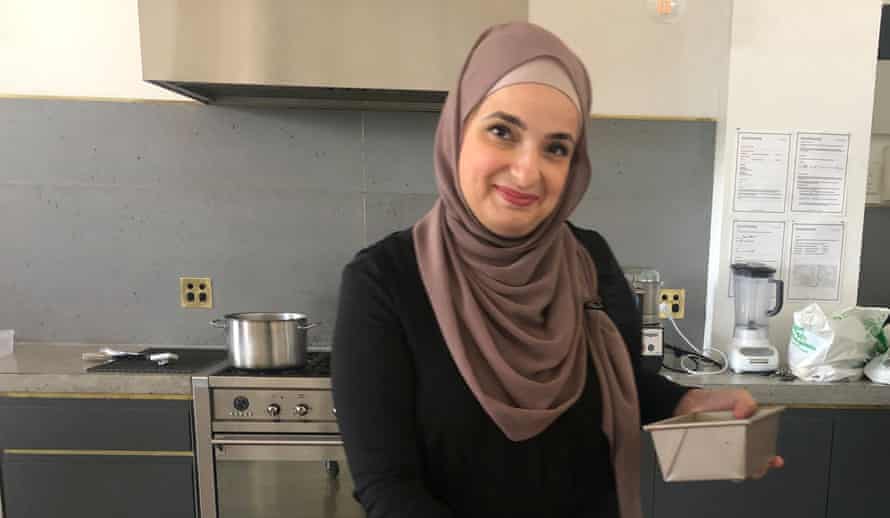
I didn’t understand the concept of time when I was young, but I always knew Eid was around the corner the second Mum laid out a blanket on the floor of the kitchen. That’s how we prepped for maamoul every year.
A semolina cookie dough filled with nuts or dates and lightly dusted with icing sugar, maamoul is traditionally eaten on Eid celebrations and just the scent of those sweet morsels brings childhood memories of Eid rushing back.
From making the dough to the careful wrapping of each and every fragile piece, my mum would make maamoul in kilos, then give it out to close family members in little individual pieces.
Every mother and grandmother proudly claims they own the best maamoul recipe, but I know in my heart of hearts my mother’s pistachio maamoul is a melt-in-your-mouth moment which I’ll never be able to compete with – and neither can anyone else.
When I was a child, we used to make the dough and the fillings and leave them in the fridge overnight, but the biscuits can easily be made in one session. Just allow a little time for the assembly.
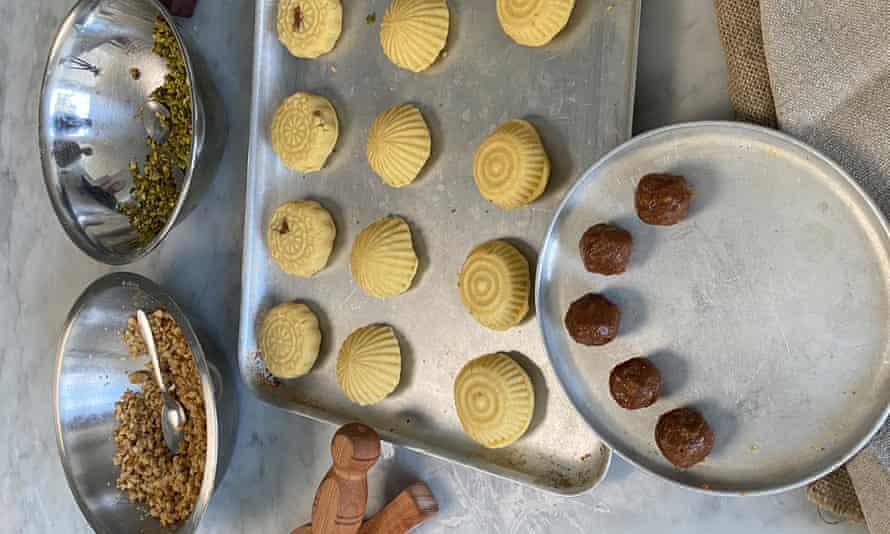
For the dough
½ tsp dry yeast powder
2 tsp orange blossom
2 tsp rosewater
250g softened unsalted butter
½ cup caster sugar
500g fine semolina
3-4 tbsp milk
For the filling
100g date paste
50g softened unsalted butter
1 tbsp rosewater
1 handful of chopped walnuts
200g shelled pistachio, finely chopped
1 tbsp orange blossom water
Icing sugar
Preheat oven
to 250C degrees, do not use the fan-forced setting.
In a small glass cup mix yeast with 2 tsp orange blossom and 2 tsp rosewater.
In a separate bowl, mix 250gm softened butter with your hands, until creamy. Sprinkle the butter with 1 tbsp of caster sugar and mix thoroughly with your hands till sugar dissolves. Add another teaspoon of sugar and continue to mix until dissolved. Add the fine semolina and incorporate thoroughly with your hands.
Next, add the dissolved yeast in slowly, while mixing with your hands. Next, slowly incorporate between 3-4 tbsp of milk – add them one spoonful at a time until the dough comes together and starts to clump, then set the dough aside.
To make the filling, mix 100g of date paste with 50g of softened butter, until they’re well incorporated, then add a teaspoon of rosewater and a handful of chopped walnuts.
For an alternative filling, mix 250g roughly chopped pistachios with 1 tsp orange blossom water and 1 tsp of rosewater and sugar to taste. You can make either, or both.
To assemble biscuits, using your hands, roll the dough into small balls the size of a golf ball then create a hollow in each of them, using your thumb to round the hollow out.
Fill the hollows with the date or pistachio mix then bring the edges together to close the hole up again. This can be a little bit fiddly, but you will get the hang of it eventually.
Using a traditional maamoul mould, which you can find at any Lebanese grocer, place each filled ball into the mould gently and flatten. Then turn the mould upside down and bang gently on the edge of the kitchen bench. I like to use different moulds for different fillings.
Gently remove the maamoul from the mould and place on a baking tray (we usually use stainless steel); repeat until all the biscuits are finished.
Bake in a pre-heated oven for about 20 minutes until light golden.
Dust the top of the pistachio filled maamouls with a little sifted icing sugar while still warm so that the sugar sticks to the biscuits nicely. Once cool, dust with extra sifted icing sugar.
The date-filled biscuits are sweet enough without sugar, so usually left plain.
Store the biscuits in airtight containers or wrap individually with greaseproof paper.
-
Fatimah Omran is general manager at The Baking Factory in Punchbowl, Sydney. Her passions are baking, travel, writing and her faith. You can follow her cooking demonstrations on Instagram, @fatimahomran_
Sueda’s Japanese sweet tapioca with coffee jelly
My family and I came to Australia from Japan about two years ago due to my father’s job. My mother and father are both Turkish. My mother comes from Eskişehir, a city in the north-west which dates back to at least 1000 BC and is estimated to be even older. In Turkish, Eskişehir literally means “old city”. My father is from Burdur in south-west Turkey where Salda Lake is famous for being one of the cleanest lakes in the world.
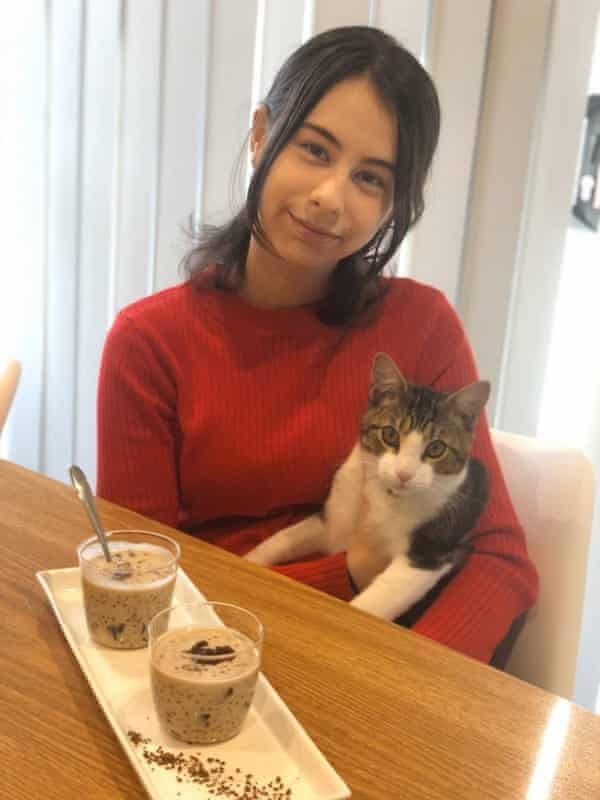
My parents met in Japan where they both lived and worked for about 20 years. My mother taught Turkish at a Turkish Cultural Centre in Tokyo and my father worked at a software company. My brother and I were both born in Japan and only visited Turkey during the summer holidays, but I feel I have a strong connection to my family’s nationality. For my parents, the connection is of course stronger; they were born and raised in Turkey so they always felt far from home.
Before we came to Australia, my parents and brother were looking forward to moving, but I was strongly against it. As time has passed, I’ve gotten used to living here but if you gave my mum a ticket to Japan now, she would take it. She feels a deep longing for Japan as the country which she considers home, because of the many years she spent there.
Having spent the first 14 years of my life in Tokyo, Japan feels like it will always have a special place in my heart too. I get nostalgic at times and miss it, and I hope to visit as soon as possible.
My brother and I attended an international school, with overseas and Japanese students. It was easy to make friends because it was such a friendly environment. I had some Japanese Muslim friends too – their mother was Japanese and their father Turkish. English became my second language and Japanese my third. I struggle not to forget Japanese now.
A question I get asked frequently is whether I prefer Japan or Australia. I do not have a definite answer for this, as both countries have their pros and cons. But thinking about my future, my preference is to live and work in Australia as it has a more easygoing lifestyle and a multicultural society. If or when I have my own children, I will tell them of my fond memories and I’d like to take them to visit to experience it for themselves.
Some of the unforgettable memories I cherish from Japan are the days of Ramadan.
Ramadan is a holy month each year when Muslims try to “elevate” spiritually, which means worshipping and becoming closer to God. My goals for this Ramadan are to finish reading the holy Quran and to worship God to the best I can to get closer to him. Living in a non-Muslim country like Japan made it hard to experience and feel Ramadan’s spiritual atmosphere and its social pleasures like fasting together, breaking fasts together, praying tarawih (the special kind of prayer said only during Ramadan) and thinking about being generous together. It was also hard to find halal food in a small Muslim and Turkish community but we went to the mosque sometimes, or to a friend’s house to break our fasts with others. I appreciated what we had and made the most of it.
I treasure memories of breaking the fast and inviting guests to iftar. In any culture, tables bring people together and Ramadan iftars don’t just mean having guests, but thinking consciously about the act of sharing your food with others.
Our iftars were even better because my mother put so much effort into filling the seats around the table with Muslim and non-Muslim friends. I would help her out as much as I could. Our house would be filled with the delicious fragrances every year. You could even smell the food outside before the guests arrived.
A very special dessert my mother would make during Ramadan that my brother and I could not resist eating was sweet tapioca with coffee jelly. It is a Japanese dessert that my mother came to know and love. She has made it ever since.
Tapioca are small pearls that create a nice texture in desserts, especially those that contain coconut milk or exotic fruits. It’s easy to make and refreshing to eat during hot summers. Whenever I have this dessert, I remember the good times in Japan. I hope you will enjoy it as much as I do.
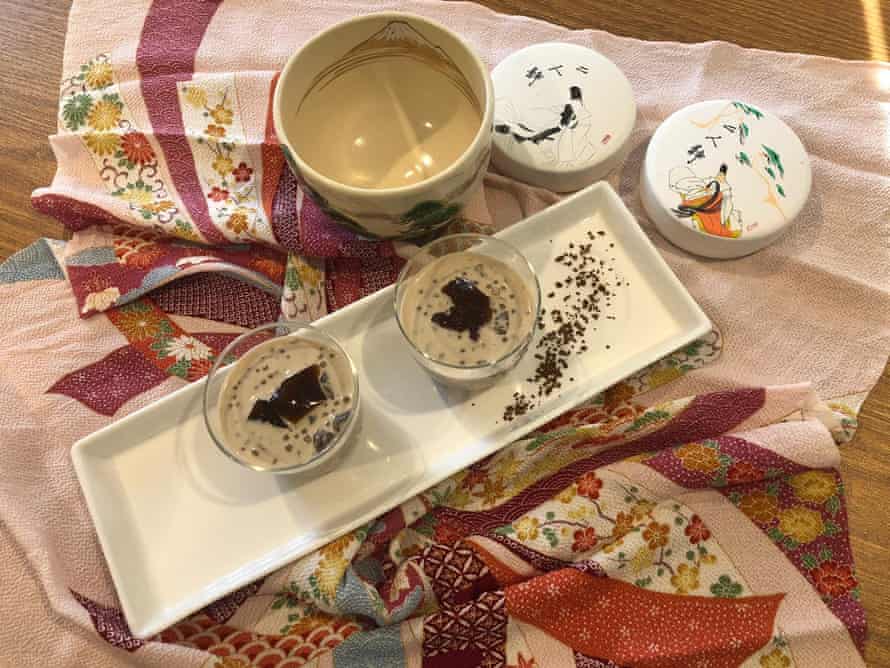
4 tbsp of instant coffee
2 sachets Kanten (Japanese veggie jelly powder)
200g small tapioca beads
1L milk
400ml coconut milk
10 tbsp sugar
Because this dish is made of chilled components, it works best if you make everything ahead of time.
To make the coffee jelly cubes, boil one litre of water, then add the coffee and kanten and stir well until dissolved.
Pour it into a flat tray and leave to chill until the mixture becomes jelly-like and firm.
To make the pearls, boil the tapioca beads in water until they become transparent. Then strain and wash with cold water.
Pour the milk and coconut milk into a pot. Add the sugar and bring to the boil. Then add the tapioca pearls into the milk while it is still hot so that they cook.
Chill the milk and pearls in the fridge, until cool.
The next day, when the coffee jelly is firm, cut it into small cubes and add them to the milky tapioca mixture.
Serve in small glasses with a spoon.
Sueda Ugurlu is a student at Amity College in Sydney. She was born in Japan to Turkish parents
Mustafa’s Iraqi turshana (dried fruit compote)
This recipe always transports me to a wonderful place and time in my life that I truly miss.
I was born in Baghdad, the capital of Iraq, and grew up there for the first 11 years of my life, experiencing both the good years and the war towards the end, before my parents, my older brother and I sought refuge in Jordan.

My mother is from northern Iraq and has a Turkish grandmother, so my mother’s family traditions were very different to my father’s side. I remember driving up into the hills towards my grandparents’ home – the air just feels different there. Northern Iraq is filled with mountains, rivers and beautiful nature. We used to refuel our water supply from a cold, clean river near my mother’s old house. The language is also different. My mother’s family could speak and understand Turkish very well, and most of their slang is influenced from Turkey.
This means I experienced foods from both ends of the country. Traditional Baghdadi food is beautiful, but the cuisine from northern Iraq is unique – for instance, turshana, which is my grandmother’s favourite dish, and mine too.
Turshana is a dried fruit stew, or perhaps a dried fruit compote. During the 2003 invasion, the weather was cold and supplies were low, meaning there were no sweets or chocolate. But there was one item that an Iraqi house would never run low on: dried fruits. Hence the unanimous love that all Iraqis, across generations, have for this dish. It is so easy to make and has special and historical memories.
I b
elieve the 11 years I spent in Iraq have played the greatest role in shaping who I am today. They were some incredible years, filled with laughter, joy and family. My extended family would spend our days in each other’s houses, learning from all my uncles and aunties, growing up with all my cousins. They’re the sweetest memories I can recall.
Some people think the war years must have been traumatic and damaging to my childhood, and in some ways, there absolutely were horrible moments. Imagine being a child who attends school and has a best friend, visits his family quite often, lives a normal life, then one day everything just stops. You find yourself stuck in a bunker with the rest of your family, in a darkly lit room, wearing a gas mask and listening to old Arabic songs as your mother tries to hold headsets over your ears so you don’t hear all the bombings.
That was the life we lived for six months: not knowing what might have happened to my best friend; losing an uncle during the bombing; seeing the emotional suffering of my parents as they desperately tried to communicate with their families, only to be welcomed with the sound of a dead telephone line. It was the toughest period in our lives. But there was also a significant silver lining beneath it all.
My family decided to flee illegally by car to seek refuge in Jordan. Jordan at the time, and to this day, is one of the most accepting countries in the Arabic realm. At the end of 2019, the number of refugees registered in Jordan stood at 750,000 persons: among them are refugees from Syria, Iraq, Yemen, Sudan and more.
We settled there for five years and adapted to a different way of living, with the UNHCR providing us with education, health and cash assistance to help us with our resettlement. Then an opportunity came up to migrate to Australia and live with our uncle, who has been here for over two decades, so we moved to Sydney.
When I make turshana, my heart goes back to the cold lockdown days in Baghdad and to childhood holidays spent with my mother’s parents in northern Iraq. In both places, we’d all gather to have this dish at night for dessert, and eat the leftovers in the morning. Because why not?
It’s a marvellous dish and a taste of northern Iraq. Do give it a try and I promise your family will bond over it too, and you will have your own love story.
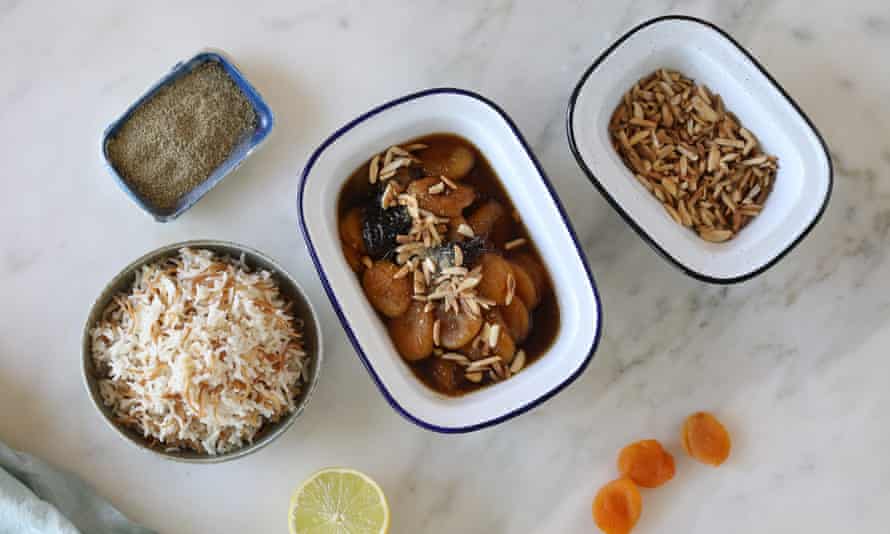
1 cup dried prunes
1 cup dried apricots
1 cup golden raisins
½ cup sugar
1 strip of lemon rind
2 whole cloves
1⁄4 tsp allspice
Jug of water
Place the dried prunes, apricots and golden raisins in a medium-sized saucepan and add just enough water to cover the fruits. Bring to a boil, then reduce the heat and simmer, covered, for 15 minutes, stirring occasionally.
Remove the pot from the heat and add the sugar, lemon rind, cloves and allspice. Stir and add a little water if the mixture looks like it may be too dry.
Return to a low heat, and simmer gently, uncovered, for 10 to 15 minutes or until fruit has softened and the syrup is thick.
Leave to cool, then remove lemon rind and cloves when it is safe to do so.
Chill several hours before serving, and eat with rice on the side, garnished with roasted almonds if desired.
-
Mustafa Allawi has a bachelors degree in media arts production from University of Technology Sydney and is the co-founder & CEO of Hazen Agency. His passion for storytelling started from a very young age in Baghdad where he spent most of his time watching old western movies. When he and his family migrated to Sydney in 2012, he was able to turn his passion into reality.
-
Next Saturday will be the third day of Eid for this year and we’ll be rounding off the series with a few more special recipes.
-
You can find more recipes on the Recipes for Ramadan website; and follow the project on Instagram, Facebook or YouTube.

:max_bytes(150000):strip_icc()/types-of-engagement-ring-settings-guide-2000-86f5b8f74d55494fa0eb043dee0de96e.jpg)
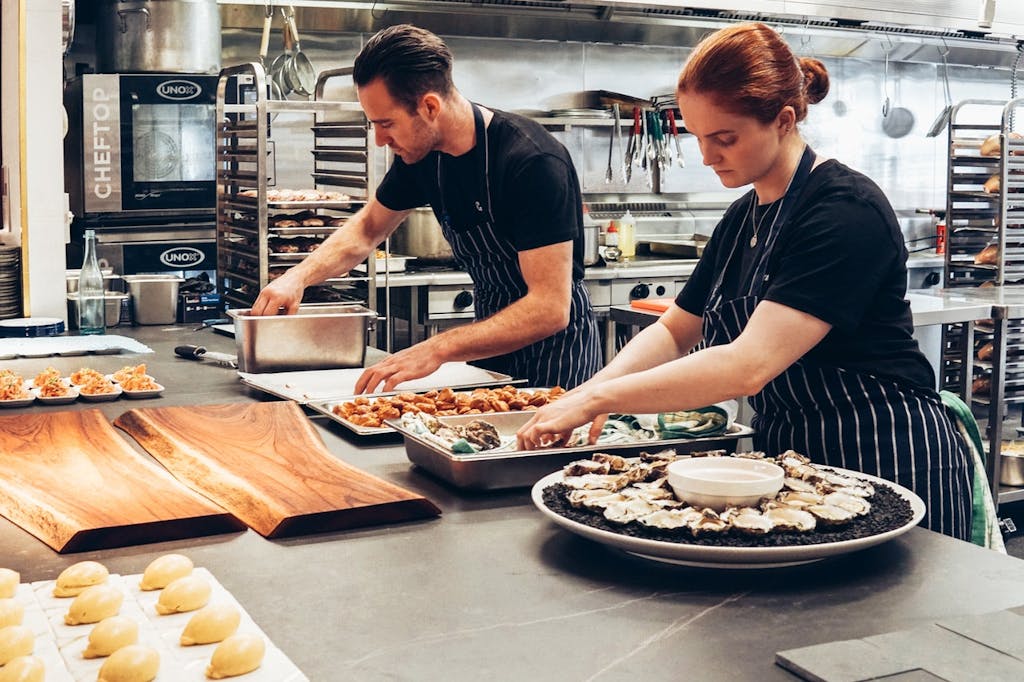
More Stories
Low Carb Gluten Free Apple Crisp
Vegetarian Shepherd’s Pie Recipe – Pinch of Yum
Our Favorite Broccoli Cheddar Soup